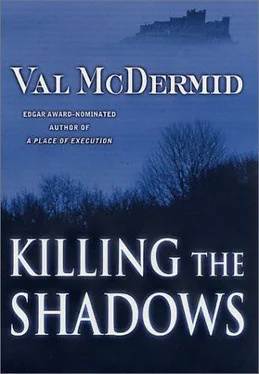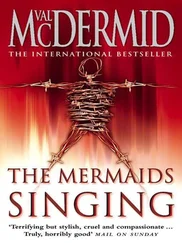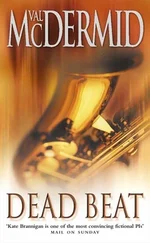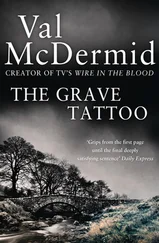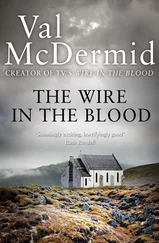This much she learned from her first pass through the flat. But Fiona was no behavioural psychologist. It wasn’t her business to try to read the crime by reading the victim. In this instance, her primary goal was to find something in Drew Shand’s life to connect him to Charles Cavendish Redford. She knew the police had searched the flat thoroughly, but at that point they’d been looking for a connection with the gay S&M world, not a communication from a frustrated writer.
She pulled the desk chair over to the filing cabinet and started going through the files. The bottom drawer was devoted to personal papers mortgage, accounts, household receipts, car insurance, the general detritus of modern life. The next drawer contained a series of suspension files that seemed to relate to Drew’s published work and work in progress. She searched the files quickly, on the off-chance that he really had stolen an idea from Redford. But there was nothing to indicate any source for his material other than his own imagination.
The top drawer was devoted to correspondence. There were files for his agent, his publisher, his publishing contracts and, finally, one marked ‘Fan Mail’. It was a surprisingly thick file, Fiona thought as she pulled it out of the drawer. She’d lived with Kit for long enough to have an appreciation of the sort of volume of mail a successful writer would ordinarily receive, but Drew’s file exceeded her expectations. The first dozen letters were much as she expected; letters of appreciation for his first novel, inquiries about when the second would be out, requests for signed bookplates, the occasional, slightly embarrassed pointing out of a minor error in the text. There were a couple of letters expressing disgust at the violence of Copycat, but nothing that would stir any great feeling of concern in the recipient.
The bulk of the file, however, consisted of letters and printed-out e — mail from men who expressed an interest in meeting the author of Copycatbecause they found him attractive and were intrigued to know if his personal sexual tastes were reflected in his novel. These were held together with a paper clip. Stuck to the top sheet was a Post-it note that read, ‘Saddo file’.
As she flicked through, a single letter dislodged itself from near the back of the sheaf. It was a folded sheet of A4. Fiona unfolded it, and let out a long sigh of satisfaction. Drew Shand, she read ,
Your career has barely begun, but already it is based on the dangerous ground of theft. You have stolen from me. You know that you have taken my work and passed it off as what you have yourself made. And your lies deprive me of what is rightfully mine. Your work is a feeble reflection of other people’s light. You take, you destroy, you are a parasite who lives off the life force of those whose gifts you envy. You know this to be true. Search your pathetic grimy soul and you will not be able to deny what you have deprived me of. The time has come for you to pay. You deserve nothing from me but my contempt and my hatred. If killing you is what it takes to grant what is rightfully mine, then so be it. It is a fair price for stealing my soul. The hour and the day will be of my choosing. I trust you will not sleep easy; you do not deserve so to do. I will enjoy your funeral. From your ashes, I will rise like a phoenix.
There were differences between this letter and the ones she had already seen. But the similarities were overwhelming. There was no doubt in her mind that Drew Shand had received a letter from the same person who had written to Georgia and Kit, and who had also composed the flyer distributed to the press conference where he had admitted his guilt.
It was hard to find an argument to contradict what Fiona was now beginning to accept was the case. The coincidences were piling too high. Whoever had killed Georgia had also killed Drew. And it looked as if that person really was Charles Cavendish Redford.
Her flat was like her, Steve thought. Light, bright and smart. Stylish and bold. Terry lived on the top floor of an old brick building off City Road. The three floors below her were occupied by a graphic design business, a leather goods workshop and a company providing post-production facilities to independent film makers. The label by the third-floor button in the goods lift read simply, Fowler Storage. Steve suspected there was no planning permission for residential use for the top storey. He also suspected that Terry didn’t give a toss.
Her living space consisted of a large open room around forty feet by fifty feet. A door at the far end gave on to a narrow bathroom and a shower cubicle. The main area was whitewashed, the floor painted a dark glossy terra cotta There was a sleeping area with a brass bed and brass rails for hanging clothes, a sitting area with half a dozen beanbags and a mini stereo system, a work area with a desk, a computer and floor-to-ceiling bookshelves. A kitchen area was squeezed into a corner by the windows, complete with a round pine table and six folding chairs. A portable TV and video on a trolley were stowed in one corner. The walls were decorated with framed Keith Haring prints, their bright splashes the main source of colour.
She’d opened the door with a flourish, imitating a trumpet fanfare through pursed lips. He’d stood on the threshold, appraising the room with a professional eye. He nodded. “Great views,” he said. “I like it.”
Then he was through the door and in her arms, their hungry mouths searching for satisfaction. No time to undress, just the urgent fumbling aside of whatever clothes got in the way, desire sweeping everything away except the consciousness of each other’s body.
Afterwards, they lay in untidy array, breath mingling, both for once entirely lacking in selfconsciousness. “So, what’s the main course?” Steve asked.
Terry giggled and snuggled her hands under his shirt. “That wasn’t even the starter. Think of it as an amuse-bouche.”
“Consider me amused.”
Terry freed herself from his arms and stood up, lithe movements that he followed with his eyes. “Let’s get comfortable,” she said, pulling her dress over her head and kicking off her shoes.
“Sounds good to me,” he agreed, getting to his feet. He scooped his mobile phone and pager out of his pockets and crossed to the desk, where he put them down next to the keyboard. He shrugged out of his clothes, throwing them over the desk chair. “Bathroom?” he asked.
Terry pointed. “Down there.”
“Don’t go away,” he said.
“As if.” As soon as the bathroom door closed behind him, she jumped to her feet and moved purposefully to the desk. She stared down at the phone and pager. The mood had been shattered the previous evening by a phone call that hadn’t even been his case, bringing to the surface all his worries and fears for his friend. And, even worse, thrusting Fiona Cameron into the space between them. She wasn’t sure what the past history there was, but all her instincts told her there was more to it than mere friendship. His body language changed whenever Fiona’s name cropped up, betraying something lurking beneath the surface. Tonight, she didn’t want Fiona in bed with them. Impulsive as always, Terry reached out. It was the work of a moment to switch off both phone and pager. Besides, she reasoned as she crossed to the bed, tonight was Friday night and the end of the working week. If she was going to have a relationship with this man, Terry knew she would have to change his workaholic ways. And there was no time like the present.
Sarah Duvall stood under the feeble spray from the shower head and wondered why every police station she’d served in had had crappy showers. She’d spent the last hour in the computer room where the officers on her squad were patiently entering the results of all the Smithfield interviews that had been conducted already and were still going on all over Greater London. While the interviews with Redford remained so unproductive, she’d decided to crack the whip in other areas of the investigation. She’d only walked away from the computers when she realized that the lines of print on the screen were wavering before her eyes as if through the lens of a swimming pool. If she had any more caffeine, her system would probably go into cardiac crisis, so she’d headed for the women’s showers in the hope that a cascade of cool water would restore her brain to something approaching working order.
Читать дальше
Конец ознакомительного отрывка
Купить книгу
